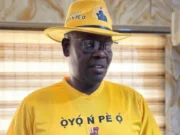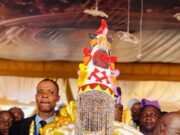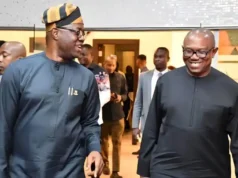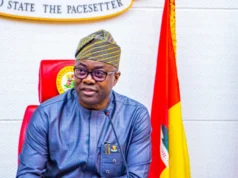Wednesday last week, the fifteenth day of December, marked the tenth anniversary of the departure and transformation from mortality to immortality of the body and soul of Yoruba Fuji Iroko tree, Chief Sikiru Ayinde Balogun, popularly known as Ayinde Barrister. He was a musical prodigy who contributed substantially and immensely to the musical, cultural and lingual development of the Yoruba people. He was a bundle of talents whose life could be regarded as woven round music like a tapestry. That day, ten years ago, it was as if there was a permanent stillness in the musical heartbeat of Yoruba land. Barrister had battled an undisclosed ailment for years and gave up at the feet of a cardiac arrest in London.
A few weeks ago, while listening to a live play of a popular Juju musician, some friends and I conducted a peremptory investigation and interrogation of the state of music in Yorubaland. We concluded that with Barrister’s exit, rigour, candour and panache ended with his exit. For instance, the Juju maestro, who had played at a funeral ceremony, only rehashed his old crowd-pulling songs and unable to meander into the present, research into the personalities of his crowd and audience, thus giving them a very flat, uninspiring line of music.
That was not Barrister. He brought rigour into his live plays and even studio recordings, so much that, even his live plays are today evergreen and eternal. No one needs to be a prophet to be able to predict that Barrister cannot die. A century from now, no matter the configuration of modernity, a world that is thirsty to navigate the contours of traditional African music cannot but drink from the brooks of his Fuji music. And don’t tell me that Wasiu Ayinde (KWAM 1) will fill the void. He cannot. His music lacks the grits and rigour that Barrister paraded. Yes, it is fast-tempoed and conduces to the musical voraciousness of the present age but when it comes to research and songs that set the brain on a wild wonder into ancient and contemporary issues, KWAM 1 isn’t there at all. His songs are too ephemeral, too peremptory to withstand any comparison. Perhaps, in the song of Saheed Osupa (Saridon P) can be found the satisfaction of that lacuna that Barrister left behind. His songs are very deep, philosophical and also set one on a mental assignment, even while the feet are gyrating to his beats.
My admiration for Barrister dates back to the 1970s. I lapped up his songs at the same time I did that of the man who today is my musical idol, Egunmogaji Ayinla Omowura. Omowura’s death placed him a step higher in my admiration, compared to Barrister’s. My research into Omowura confirmed a thesis which, whenever I submit it, angers some die-hard Barrister fans. The thesis is that, if Omowura had not died, there would never have been the Barrister who supervened over the traditional Yoruba African music stratosphere of the 1980s to 2010 like a wild wind. Omowura had a majesty, aura and eclectic appreciation that Barrister didn’t have and could not have had, placed side by side Omowura.
Not the age differential between them; not even the crowd appeal of the 1970s which Omowura had but which Barrister could not withstand. Certainly not the fact that Barrister was Captain of Omowura’s Fans Club while both were musical stars. Not also because Barrister lapped up some of Omowura’s songs at his death, prominent of which was the Ajikogba ede track which belonged to Omowura. It was the fact that Omowura was like a tempest which would swallow the wind of an Ayinde Barrister any day, any time. In 1978 or thereabout, when Barrister attempted to cross the musical railway pathway of an Omowura moving train, the Egunmogaji gave him a jab in Ayinde ma je ki ngbo… (Ayinde, perish the thought of your imagined superiority). Frightened, Barrister replied like a dog whose tail was tucked into its anus.
Barrister was not a counterpoise to Omowura as both didn’t sing the same variant of Yoruba traditional music. While he sang Fuji, Egunmogaji sang Apala. In my book, Ayinla Omowura: Life and Times of an Apala Legend, I attempted to state that in the history of Yoruba traditional music, there had always been seemingly fratricidal wars between musical counterpoises. While Abibu Oluwa (I enjoy his panegyrics for Herbert Macaulay, playing musical pun with his alias, Ejo ngboro) was like the forerunner of such traditional music. Lefty Salami was also in that mould. S. Aka Baba Wahidi dueled with fellow Egba kinsman Yusuph Olatunji because they sang same Sakara music. Kasumu Adio, born 1928, who died very young, sang better Apala than Haruna Ishola (recall his elegy to Col Adekunle Fajuyi and the Odale Ore track). Adio also engaged in a musical spat with Ishola, alias Babangani Agba, as well as Raji Owonikoko and his self-styled Kwara System Originator Band. However, Ibadan-based anedoctal musical lord, Epo Akara, was in a world of his own.
I had engaged an Egba man, a very brilliant lover of arts, culture and language of the Yoruba people and a huge boardroom giant (I didn’t get his permission to mention his name here) in a comparative analysis of Omowura and Barrister recently. He confirmed this thesis of mine. He agreed with me absolutely. Gani Kola Balogun; our journalism forebear, Elder Dayo Odeyemi, popularly known as Hunter (by the way, please accept my belated happy birthday, sir) and my friend, Adebayo Ojo, former Oyo State Attorney General, who are all fanatics of Barrister’s songs, won’t agree with me, I presume. I may also not be on same page with even musical history researchers like Professor Saheed Aderinto and Waliu Alao.
No doubt, however, Barrister approximated and appropriated the absence of Omowura in an awesome way for his flourishing and died greater than Omowura. He garnered a huge contemporary audience than Omowura probably gathered in his lifetime. However, if both musicians had existed side by side into 2010 when Barrister died, Barrister could never have been able to unbuckle the musical shoes of Omowura who bestrode the Yoruba traditional musical scene of the 1970s like a talismanic colossus. Or, what do you think?





































